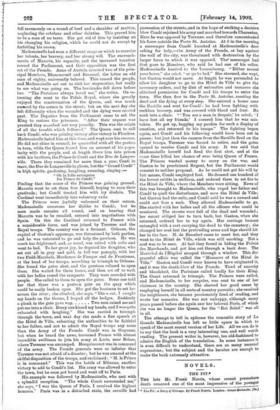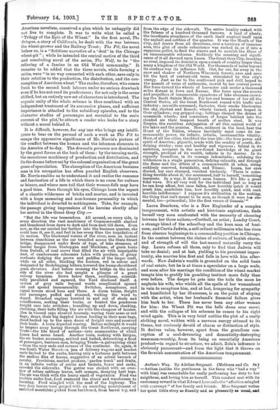NOVELS.
THE PIT.* THE late Mr. Frank Norris, whose recent premature death removed one of the most impressive of the younger
•
Th. Pit: a Story of Chicago. By Frank Norris. London : Grant Richards. [6s4
American novelists, conceived a plan which he unhappily did not live to complete. It MO to write what he called a "Trilogy of the Epic of the Wheat." In the first novel, The Octopus, a story of California, he dealt with the war between the wheat-grower and the Railway Trust; The PIE, the novel before us, is a "fictitious narrative of a deal ' in the Chicago wheat-pit " ; while he intended the central motive of the third and concluding novel of the series, The Wolf, to be "the relieving of a famine in an Old World community." It remains to be added that the three novels, while forming a series, were "in no way connected with each other, save only in their relation to the production, the distribution, and the con- sumption of American wheat." The reader, therefore, who comes fresh to the second book labours under no serious drawback even if he has not read its predecessor; for not only is the scene shifted, but an entirely new set of characters is introduced. The organic unity of the whole scheme is thus combined with an independent treatment of its successive phases, and sufficient importance is attached to the subsidiary episodes, and to the character studies of personages not essential to the main current of the plok'to attract a reader who looks for a story without a moral behind it.
It is difficult, however, for anyone who brings any intelli- gence to bear on the perusal of such a work as The Pit to escape the oppressive significance of Mr. Norris's picture of the conflict between the human and the inhuman elements in the America of to-day. The dramatis personae are dominated by the great forces at the back of them : by the teeming earth, the monstrous machinery of production and distribution, and (in the drama before us) by the colossal organisation of the great game of speculation. The absorption of the American business man in his occupation has often puzzled English observers. Mr. Norris enables us to understand it and realise the romance and fascination of a life in which there is no room for culture or leisure, and where men toil that their women-folk may have a good time. Seen through his eyes, Chicago loses the aspect of a chaotic wilderness of bricks and mortar, and is invested with a huge menacing and non-human personality in which the individual is dwarfed to nothingness. Take, for example, the passage giving impressions of the heroine shortly after her arrival in the Great Grey City :- "But the life was tremendous. All around, on every side, in every direction the vast machinery of Commonwealth clashed and thundered from dawn to dark and from dark till dawn. Even now, as the car carried her farther into the business quarter, she could hear it, see it, and feel in her every fibre the trepidation of its motion. The blackened waters of the river, seen an instant between stanchions as the car trundled across the State Street bridge, disappeared under fleets of tugs, of lake steamers, of lumber barges from Sheboygan and !Mackinac, of grain boats from Duluth, of coal scows that filled the air with impalpable dust, of cumbersome schooners laden with produce, of grimy rowboats dodging the prows and paddles of the larger craft, while on all sides, blocking the horizon, red in colour and designated by Brobdingnag letters, towered the hump-shouldered grain elevators. Just before crossing the bridge on the north side of the river she had caught a glimpse of a great railway terminus. Down below there, rectilinear, scientifi- cally paralleled and squared, the Yard disclosed itself. A system of grey rails beyond words complicated opened out and spread immeasurably. Switches, semaphores, and signal towers stood here and there. A dozen trains, freight and passenger, puffed and steamed, waiting the word to depart. Detached engines hurried in and out of sheds and roundhouses, seeking their trains, or bunted the ,ponderous freight cars into switches ; trundling up and down, clanking, shrieking, their bells filling the air with the clangour of tocsins. Men in visored caps shouted hoarsely, waving their arms or red flags- drays, their big dappled horses feeding in their nose bags, stood backed up to the open doors of freight cars and received their loads. A train departed roaring. Before midnight it would be leagues away boring through the Great Northwest, carrying Trade—the life blood of nations—into communities of which Laura had never heard. Another train, reeking with fatigue, the air brakes screaming, arrived and halted, debouching a flood of passengers, business men, bringing Trade—a galvanising elixir —from the very ends and corners of the continent. Or, again, it was South Water Street—a jam of delivery wagons and market carts backed to the curbs, leaving only a tortuous path between the endless files of horses, suggestive of an actual barrack of cavalry. Provisions, market produce, 'garden truck' and fruits, in an infinite welter of crates and baskets, boxes and sacks, crowded the sidewalks. The gutter was choked with an over- flow of refuse cabbage leaves, soft oranges, decaying beet tops. The air was thick with the heavy smell of vegetation. Food was trodden under foot, food crammed the stores and warehouses to bursting. Food mingled with the mud of the highway. The very dray horses were gorged with an unending nourishment of snatehed mouthfuls picked from backboard, from barrel top, and from the edge of the sidewalk. The entire locality reeked with the fatness of a hundred thousand furrows. A land of plenty, the inordinate abundance of the earth itself emptied itself upon the asphalt and cobbles of the quarter. It was the Mouth of the City, and drawn from all directions, over a territory of immense area, this glut of crude subsistence was sucked in, as if into a rapacious gullet, to feed the sinews and to nourish the fibres of an immeasurable colossus. Suddenly the meaning and signifi- cance of it all dawned upon Laura. The Great Grey City, brooking no rival, imposed its dominion upon a reach of country larger than many a kingdom of the Old World. For thousands of miles beyond its confines was its influence felt. Out, far out, far away in the snow and shadow of Northern Wisconsin forests, axes and saws bit the bark of century-old trees, stimulated by this city's energy. Just as far to the southward pick and drill leaped to the assault of veins of anthracite, moved by her central power. Her force turned the wheels of harvester and seeder a thousand miles distant in Iowa and Kansas. Her force spun the screws and propellers of innumerable squadrons of lake steamers crowd- ing the Sault Sainte Marie. For her and because of her all the Central States, all the Great Northwest roared with traffic and industry ; sawmills screamed; factories, their smoke blackening the sky, clashed and flamed; wheele turned, pistons leaped in their cylinders ; cog gripped cog ; beltings clasped the drums of mammoth wheels ; and converters of forges belched into the clouded air their tempest breath of molten steel. It was Empire, the resistless subjugation of all this central world of the lakes and the prairies. Here, midmost in the land, beat the Heart of the Nation, whence inevitably must come its im- measurable power, its infinite, infinite, inexhaustible vitality.. Here, of all her cities, throbbed the true life—the true power and spirit of America ; gigantic, crude with the crudity of youth, dis- daining rivalry ; sane and healthy and vigorous ; brutal in its ambition, arrogant in the new-found knowledge of its giant strength, prodigal of its wealth, infinite in its desires. In its capacity boundless, in its courage indomitable ; subduing the wilderness in a single generation, defying calamity, and through the flame and the debris of a commonwealth in ashes, rising suddenly renewed, formidable, and Titanic. Laura, her eyes dizzied, her ears stunned, watched tirelessly. There is some- thing terrible about it,' she murmured, half to herself, something insensate. In a way, it doesn't seem human. It's like a great tidal wave. It's all very well for the individual just so long as he can keep afloat, but once fallen, how horribly quick it would crush him, annihilate him, how horribly quick, and with such horrible indifference ! I suppose it's civilisation in the making, the thing that isn't meant to be seen, as though it were too ele- mental, too—primordial; like the first verses of Genesis."
Laura Dearborn, who is a New Englander of a complex temperament, with artistic and histrionic aspirations, finds herself very soon confronted with the necessity of choosing between her three suitors,—Corthell, an artist; Landry Court, a strange blend of the schoolboy and the keen man of busi- ness; and Curtis Jadwin, a self-reliant millionaire who has risen from obscure beginnings to a commanding position in Chicago. In the contest between the claims of culture, of boyish charm, and of strength of will the last-named naturally carry the day. Laura refuses all three, only to find that Jadwin will take no denial; and at last, yielding to his persistent impor- tunity, she marries him first and falls in love with him after- wards. Now Jadwin's wealth is grounded on the solid basis of real estate, but he is at times a speculator on a large scale, and soon after his marriage the condition of the wheat market tempts him to gratify his gambling instinct more fully than ever before. The deeper be gets into the toils the more he neglects his wife, who wields all the spells of her womanhood in vain to recapture him, and at last, hungering for sympathy and humiliated by her ill-success, is on the point of eloping with the artist, when her husband's financial failure gives him back to her. There has never been any other woman for him: the Wheat Pit was the belle dame sans frnerci, and with the collapse of his schemes he comes to his right mind again. This is in very brief outline the plot of a really striking novel, written with a nervous energy attuned to its theme, but curiously devoid of charm or distinction of style. It derives value, however, apart from the grandiose con- ception of a soul-devouring and domesticity-destroying mammon-worship, from its being an essentially American product—in regard to structure, we admit, Zola's influence is obviously paramount—and from the light that it throws on
the feverish concentration of the American temperament.







































 Previous page
Previous page